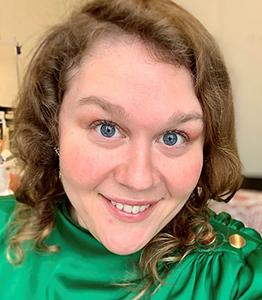Arabeth Balasko is the Photograph Archivist at the Anchorage Museum. She recently participated in the July 2020 Wikidata Summer Institute course, and reflects on how linked data inspires her to want to be a better archivist in this guest blog post.

con·nec·tion/kəˈnekSH(ə)n/ – Noun: “A relationship in which a person, thing, or idea is linked or associated with something else.”
In order to research, access, and evaluate information, we all use linked data. Language, word choices, and applied descriptors help us find what we are looking for every single day. In your daily life, whether you know it or not, you use linked data (structured data which is interlinked with other data) and metadata (data about data) for your internet searches, your shopping purchases, your Netflix selections, your Spotify playlists, your Instagram posts – and the list goes on and on. Data truly infiltrates every aspect of one’s life.
I spend a lot of my time thinking about the power of words and the carefully curated data choices used to provide access to information – both digitally and physically. I ruminate on how personal biases and applied taxonomy can either help, hinder, or harm user accessibility.
When you think about the power and influence data, language choices, and descriptors have, particularly within the GLAM sectors (Galleries, Libraries, Archives, and Museums), you have to stop and think about the intentions of the “humans” behind this data creation, behind these descriptive biases and ultimately, behind one’s ability to digitally access information.
Linked data truly connects us all – so why are so many folks hesitant to embrace the numerous schemas, data sets, triples, and endless possibilities of queries? I must admit, when I first embarked on my Wikidata journey, I was not quite sure what all this jargon meant, but I was excited to learn how linked data can truly change lives through access to information.
One amazing takeaway I had from my experience in Wikidata’s immersive data-escapades, is that its approach to collaborative data creation and accessibility for all users, is truly universal. This globalized, grass-roots project to create a pathway to information is truly like no other I have encountered in my 7.5 years in the GLAM sectors.
I appreciated the fact that my Wikidata cohort was made up of an assortment of professionals from all over the world in the varied GLAM and IT sectors, looking to create a better user experience and trajectory for access to the diversified collections and data they managed for their respective organizations.
Additionally, it was refreshing to learn that with Wikidata you can initiate collective dialog and constructive conversations around the many different interpretations of “data.” You can challenge language and word choices used by an editor, you can suggest new edits to be made and/or updated, you can request to have a page translated into a different language, and you can update and build off of another user’s entry. With this collective approach, data truly becomes universal; however, that too is met with its own set of challenges.
For example, with one entry I was working on, for John Kennedy Toole, the author of A Confederacy of Dunces, there was conflicting data about the manner in which he died. I was able to confirm his cause of death and cite the resource as well as the access date, which helped create a more reputable source of information for users to access and trust.
I also found Wikidata’s notice or warning to the editor of a potentially unreliable source such an essential tool during the editing process. In a world where misinformation is often presented as fact, this is a great way to promote and instill trust with your editors, as well as your users, in order to make sure that information being presented is as accurate and factual as possible.
One of my favorite aspects of this course was seeing linked data in action – meaning, by creating new records and new entries, other pre-existing and/or related records became more relevant, enriched, and “alive.” The ability to see how fluid access to information is was eye-opening, and inspirational. From being able to connect collections and stories from around the world, to being able to run SPARQL queries that were specific to individual user’s needs, my experience in the Wikidata course made me think about data and access in a whole new way.
For me, the GLAM sectors should be an inclusive place for all voices – I always strive to put access at the forefront of my mission. It is truly vital that I approach my accessibility mission with continual advocacy for diverse voices, perspectives, and experiences to be uplifted and represented in archival repositories. As Sharad Vivek Sagar states, “For too long, information, opportunities, and resources have been constraints, they need to be the bridges.” For me, one way to build that bridge is through linked data and ensuring that all users have access to information – who knows how it may change their life – or yours.
To take a course like the one Arabeth took, visit wikiedu.org/wikidata.
Hero image credit: Craig Talbert, CC BY 2.0, via Wikimedia Commons; Image of Arabeth credit: Archivistsmakeitlastlonger, CC BY-SA 4.0, via Wikimedia Commons
